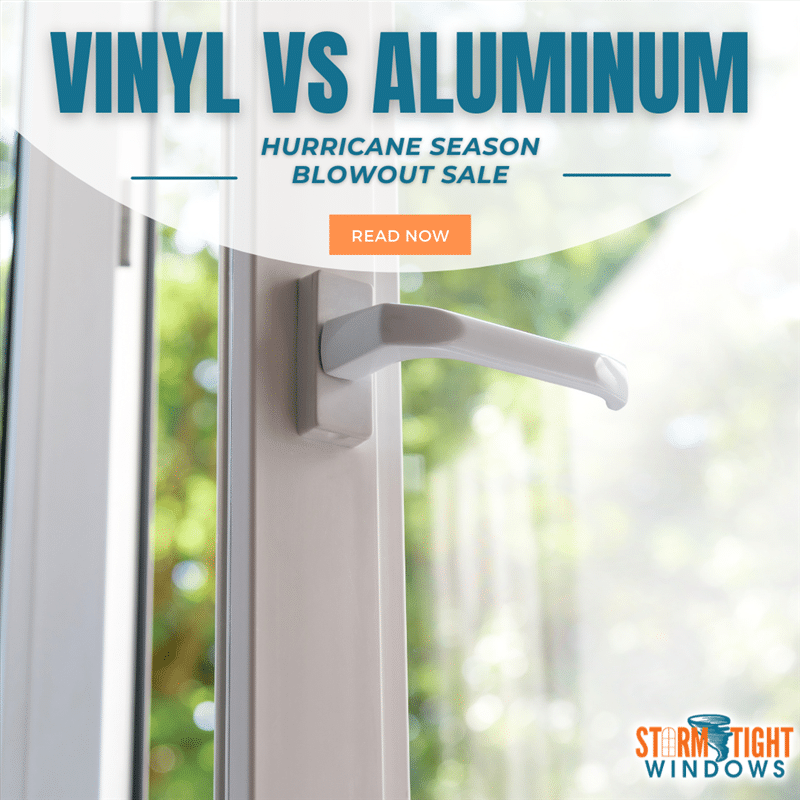When it comes to choosing windows for your home, the options can be overwhelming. Two popular choices for impact windows are aluminum and vinyl, but what exactly is the difference between the two? Both materials have their own unique qualities and benefits, and understanding these differences can help you make an informed decision for your home. From durability to energy efficiency, we explore the contrasting features of aluminum and vinyl impact windows, so you can confidently choose the right option for your needs.
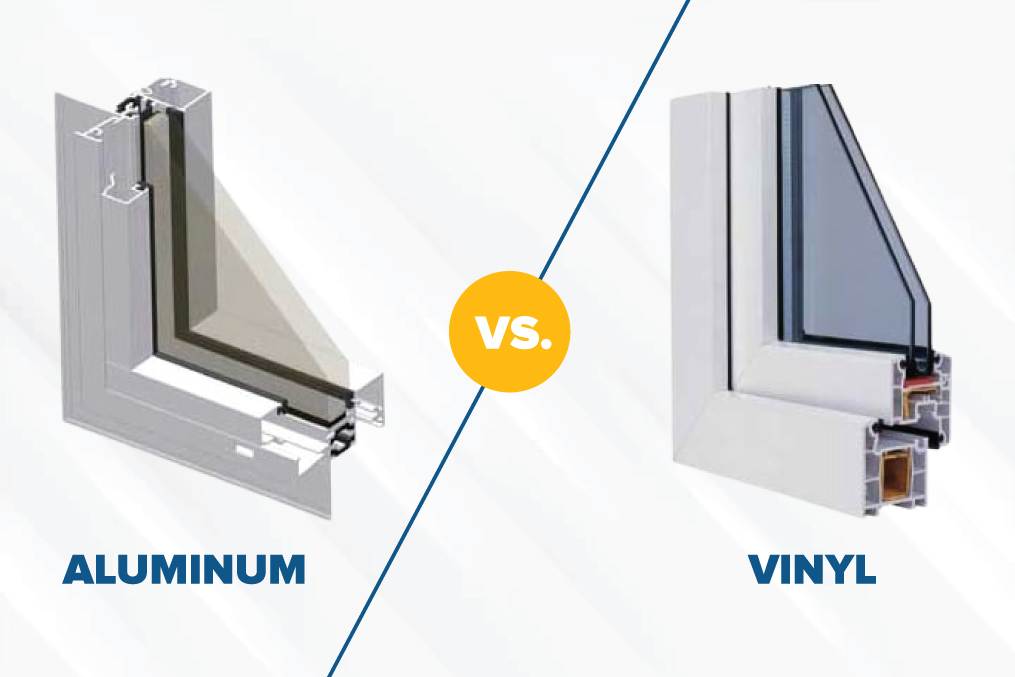
This image is property of www.guardianhurricaneprotection.com.
Construction Materials
Aluminum Windows
Aluminum windows are made from an alloy composed mainly of aluminum, with other elements such as magnesium and silicon added to enhance its strength and durability. The frames of aluminum windows are sturdy and resistant to warping, making them an ideal choice for areas with extreme weather conditions. The aluminum frames are also lightweight, making them easier to install and handle.
Vinyl Windows
On the other hand, vinyl windows are constructed using a synthetic material called polyvinyl chloride (PVC). The frames of vinyl windows are made entirely of this durable plastic material. Vinyl windows are known for their excellent resistance to moisture, making them highly suitable for areas with high humidity levels or proximity to bodies of water. The PVC material is also resistant to rot, corrosion, and pests, ensuring the longevity of the windows.
Strength and Durability
Aluminum Windows
Aluminum windows are renowned for their strength and durability. The aluminum alloy used in their construction provides excellent structural integrity and can withstand high winds and heavy impacts. This makes aluminum windows a popular choice for areas prone to hurricanes or other extreme weather conditions. Additionally, aluminum is a non-combustible material, making it a safer option in case of fire emergencies.
Vinyl Windows
Although not as strong as aluminum, vinyl windows still offer adequate durability. The PVC material used in their construction is impact-resistant, making vinyl windows suitable for areas with the potential for impact damage, such as regions prone to storms or hailstorms. However, it is important to note that extreme heat can cause vinyl to warp or distort, so they may not be the best choice for areas with consistently high temperatures.
Energy Efficiency
Aluminum Windows
When it comes to energy efficiency, aluminum windows may not be the most favorable option. Aluminum is a good conductor of heat, which means that it can easily transfer heat or cold from the outside to the inside of a building, leading to temperature fluctuations. This can result in higher heating or cooling costs as the HVAC system has to work harder to maintain a comfortable indoor environment.
Vinyl Windows
Vinyl windows, on the other hand, offer better energy efficiency. The PVC material used in their construction has natural insulating properties, which helps keep the interior temperature stable and reduces the reliance on heating or cooling systems. Vinyl windows also have airtight seals and multi-chambered frames, further enhancing their energy-saving capabilities. This can result in lower energy bills and a more comfortable living or working environment.
Maintenance
Aluminum Windows
One advantage of aluminum windows is their low maintenance requirements. The aluminum frames are resistant to rust and rot, eliminating the need for regular painting or staining. They are also easy to clean and can be maintained with simple household cleaning products and a soft cloth. However, over time, the aluminum frames may develop scratches or dents, which may require cosmetic repairs or replacement of specific components.
Vinyl Windows
Vinyl windows are known for their low maintenance requirements. The PVC material used in their construction is resistant to moisture, so there is no need for painting or sealing. Cleaning vinyl windows is also a breeze, as they can be easily wiped clean with a mild detergent and water. Unlike aluminum windows, vinyl windows do not scratch or dent easily, which contributes to their longer lifespan with minimal upkeep.
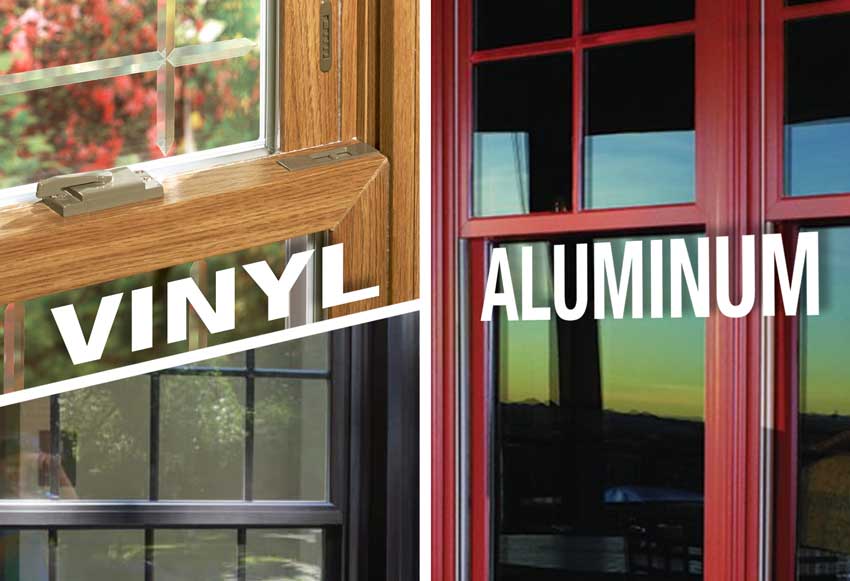
This image is property of www.protoolreviews.com.
Cost
Aluminum Windows
Aluminum windows tend to be more expensive than vinyl windows. The cost of aluminum as a raw material and the manufacturing process involved in creating the frames contribute to the higher price point. Additionally, the installation of aluminum windows may require specialized skills and tools, which can add to the overall cost. However, it is important to consider the long-term durability and potential energy savings when evaluating the cost-effectiveness of aluminum windows.
Vinyl Windows
Vinyl windows are generally more affordable than aluminum windows. The PVC material used in their construction is readily available, making it a cost-effective option. The installation process for vinyl windows is also relatively straightforward, reducing labor costs. Moreover, the energy-saving benefits of vinyl windows can lead to long-term cost savings on heating and cooling expenses, making them a financially viable choice for many homeowners.
Design Options
Aluminum Windows
Aluminum windows offer a wide range of design options to suit various architectural styles and preferences. The frames can be customized in terms of color, finish, and profile, allowing for a personalized look. Aluminum windows also come in different shapes and sizes, including standard rectangular designs and arched or circular options. The versatility of aluminum makes it a popular choice among architects and designers seeking to create a modern or industrial aesthetic.
Vinyl Windows
Vinyl windows also provide a variety of design options, although they may be more limited compared to aluminum windows. They are available in different colors, including wood-grain finishes that mimic the appearance of natural wood. However, due to the limitations of the PVC material, the design options for vinyl windows may be more standardized, with fewer shapes and profiles to choose from. Nonetheless, vinyl windows can still complement a wide range of architectural styles.
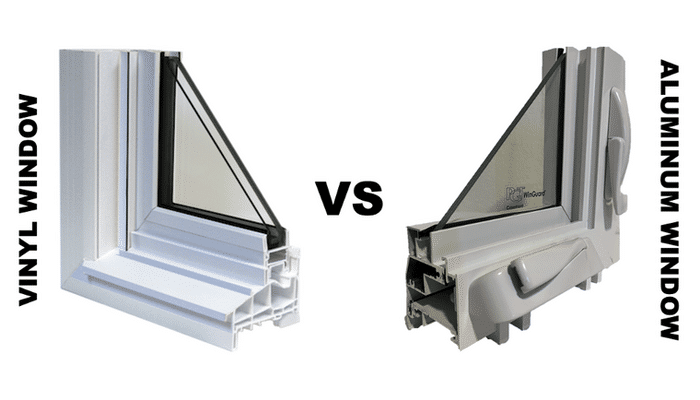
This image is property of www.sofloimpactwindows.com.
Installation Process
Aluminum Windows
The installation process for aluminum windows can be more complex compared to vinyl windows. The inherent strength and rigidity of aluminum frames may require additional support structures during installation. Moreover, the customization options available for aluminum windows may necessitate precise measurements and fitting to ensure a proper installation. Hiring professionals experienced in working with aluminum windows is recommended to ensure a seamless and secure installation.
Vinyl Windows
Installing vinyl windows is generally a simpler process compared to aluminum windows. The lightweight nature of vinyl frames makes them easier to handle and maneuver during installation. Vinyl windows often come pre-fabricated and can be custom-made to fit specific openings, reducing the need for extensive modifications. However, it is still advisable to seek professional assistance to ensure proper installation and to guarantee the windows’ optimal performance.
Environmental Impact
Aluminum Windows
Aluminum windows have a relatively high environmental impact due to the extraction and refining processes involved in obtaining aluminum as a raw material. These processes consume significant amounts of energy and can contribute to carbon emissions. However, aluminum is a highly recyclable material, and many aluminum windows are made using recycled aluminum. Choosing aluminum windows manufactured from recycled materials can significantly reduce their environmental footprint.
Vinyl Windows
The production of vinyl windows also has a moderate environmental impact. PVC, the primary material used, requires energy-intensive manufacturing processes that can generate pollution. However, PVC can also be recycled, and the recycling process for PVC is relatively efficient. Opting for vinyl windows made from recycled PVC or choosing suppliers committed to sustainable practices can minimize the environmental impact associated with vinyl window production.
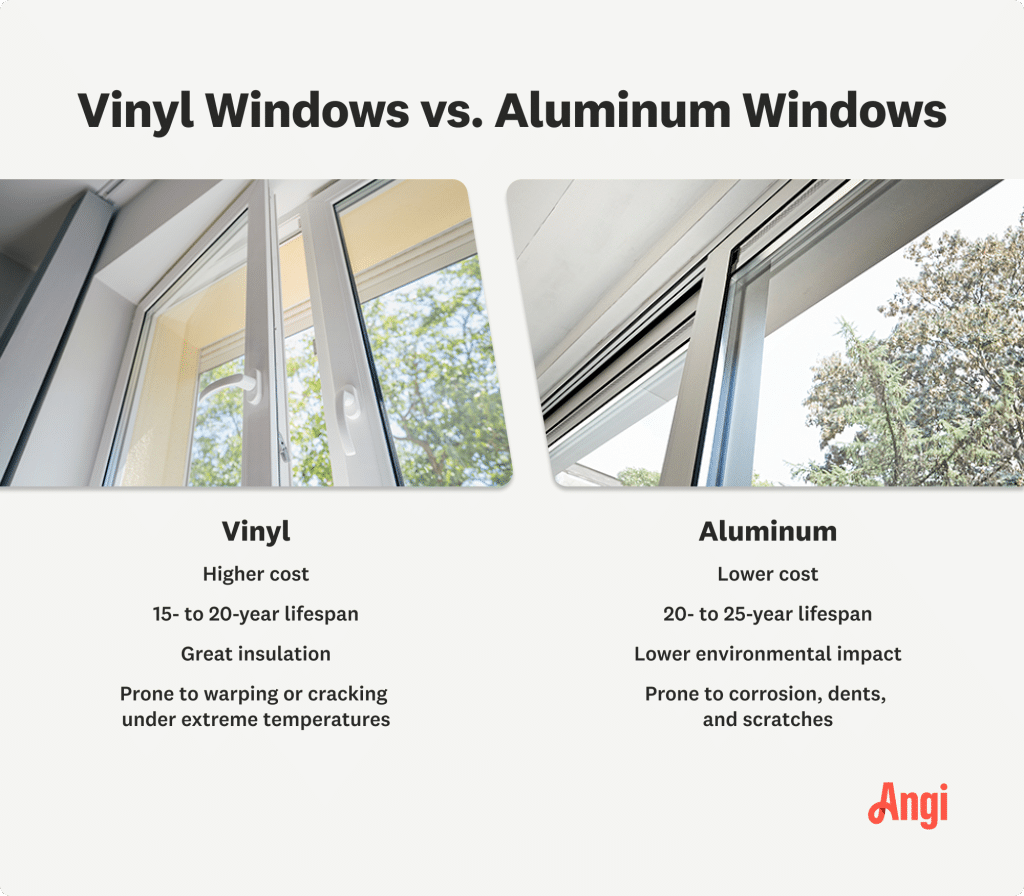
This image is property of media.angi.com.
Noise Reduction
Aluminum Windows
Aluminum windows provide a moderate level of noise reduction. While the sturdy frames and tight seals help to minimize noise infiltration, aluminum is not as effective in sound insulation compared to other materials. Additional measures, such as using double or triple glazing and installing soundproofing window films, can further enhance the noise reduction capabilities of aluminum windows.
Vinyl Windows
Vinyl windows offer superior noise reduction capabilities compared to aluminum windows. The PVC material used in their construction has inherent sound insulation properties, helping to reduce external noise. Furthermore, the multi-chambered frames and airtight seals of vinyl windows create an additional barrier against noise infiltration. As a result, vinyl windows can significantly contribute to creating a quieter and more peaceful indoor environment.
Aesthetic Appeal
Aluminum Windows
Aluminum windows are often chosen for their sleek and modern appearance. The slim profiles of aluminum frames allow for larger glass areas, maximizing natural light and providing unobstructed views. The customization options, such as different colors and finishes, enable homeowners to achieve a contemporary or industrial aesthetic. Aluminum windows can add a touch of elegance and sophistication to any architectural design.
Vinyl Windows
While vinyl windows may not offer the same level of aesthetic versatility as aluminum windows, they can still enhance the overall look of a building. The availability of different color options and wood-grain finishes allows homeowners to choose a style that complements the existing exterior or interior design. Vinyl windows provide a clean and polished appearance, suitable for a variety of architectural styles, from traditional to modern.
In conclusion, both aluminum and vinyl windows have their own unique qualities and characteristics. Aluminum windows excel in terms of strength and durability, making them ideal for extreme weather conditions. However, they may not be as energy-efficient and can be more costly. On the other hand, vinyl windows offer better energy efficiency, low maintenance requirements, and a more affordable price point. While their design options may be somewhat limited, they can enhance a building’s aesthetic appeal and provide excellent noise reduction. Ultimately, the choice between aluminum and vinyl windows will depend on individual preferences, budget considerations, and specific requirements for each project.
